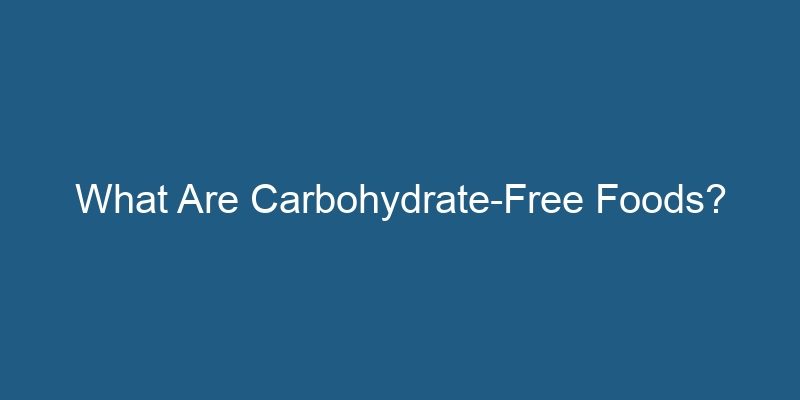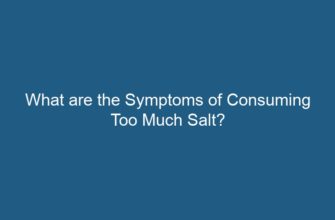Carbohydrates are an essential macronutrient that our bodies need for energy. However, some people may need to limit their carbohydrate intake for various reasons such as weight loss, managing diabetes, or following a low-carb diet. In this article, we will explore the topic of carbohydrate-free foods and provide a comprehensive list of products that do not contain carbohydrates.
Understanding Carbohydrates
Carbohydrates are one of the three macronutrients, along with proteins and fats, that provide energy to the body. They are composed of sugar molecules and can be classified into three main types:
- Simple Carbohydrates: These are made up of one or two sugar molecules and are quickly digested by the body. Examples include glucose, fructose, and lactose.
- Complex Carbohydrates: These consist of multiple sugar molecules linked together and take longer to digest. Foods rich in complex carbohydrates include whole grains, legumes, and starchy vegetables.
- Fiber: Fiber is a type of carbohydrate that cannot be digested by the body. It provides bulk to the diet and helps maintain healthy digestion.
The Importance of Carbohydrates
Carbohydrates are the primary source of energy for our bodies. They fuel our brain, muscles, and other organs, enabling them to function optimally. Additionally, carbohydrates play a crucial role in regulating blood sugar levels, supporting digestion, and promoting overall gut health.
While carbohydrates are essential, it’s important to note that not all carbohydrates are created equal. Foods high in refined carbohydrates, such as white bread, sugary drinks, and pastries, can lead to rapid spikes in blood sugar levels and may contribute to weight gain and the development of chronic diseases when consumed in excess.
The Need for Carbohydrate-Free Foods
There are several reasons why individuals may choose to limit their carbohydrate intake or follow a carbohydrate-free diet:
- Weight Loss: Restricting carbohydrates can be an effective strategy for weight loss, as it helps reduce overall calorie intake and promotes fat burning.
- Diabetes Management: People with diabetes often need to monitor their carbohydrate intake to manage blood sugar levels effectively. By reducing carbohydrate consumption, they can better control their glucose levels.
- Low-Carb Diets: Some individuals opt for low-carb diets, such as the ketogenic diet, for various health benefits, including improved metabolic health, increased satiety, and better insulin sensitivity.
List of Carbohydrate-Free Foods
While most foods contain some amount of carbohydrates, there are certain products that are virtually carbohydrate-free. These include:
1. Meats and Poultry
Meat and poultry products, such as beef, chicken, turkey, and pork, are carbohydrate-free. They are excellent sources of protein and essential nutrients. When consuming meat, it’s important to choose lean cuts and avoid processed meats that may contain added carbohydrates.
2. Fish and Seafood
Fish and seafood are also carbohydrate-free options. They are rich in omega-3 fatty acids, which have been associated with numerous health benefits, including improved heart health and brain function. Examples of low-carb fish and seafood include salmon, trout, shrimp, and tuna.
3. Eggs
Eggs are a versatile and nutritious food that contain no carbohydrates. They are packed with high-quality protein, vitamins, and minerals. Eggs can be enjoyed in various ways, such as boiled, scrambled, or used as an ingredient in recipes.
4. Dairy Products
Most dairy products are relatively low in carbohydrates. However, it’s important to choose unsweetened and unflavored options to avoid added sugars. Examples of carbohydrate-free dairy products include plain Greek yogurt, cottage cheese, and certain types of cheese like cheddar or mozzarella.
5. Fats and Oils
Fats and oils are naturally carbohydrate-free. They provide essential fatty acids, help absorb fat-soluble vitamins, and contribute to satiety. Good sources of healthy fats include avocado, olive oil, coconut oil, and nuts.
6. Non-Starchy Vegetables
While most vegetables contain carbohydrates, non-starchy vegetables are very low in carbs and can be included in a carbohydrate-free diet. Examples of non-starchy vegetables include broccoli, cauliflower, spinach, kale, bell peppers, and zucchini. These vegetables are also high in fiber, which aids digestion and promotes feelings of fullness.
7. Herbs and Spices
Herbs and spices are typically carbohydrate-free and can add flavor and aroma to dishes without contributing to carb intake. Common herbs and spices include basil, oregano, rosemary, cinnamon, and turmeric.
8. Beverages
While it’s important to stay hydrated, many beverages contain carbohydrates. However, there are several options that are carbohydrate-free, including water, unsweetened tea, and black coffee. It’s crucial to avoid sweetened beverages, sodas, and fruit juices, as they are typically high in added sugars.
Conclusion
While carbohydrates are an essential part of a healthy diet, there may be instances where individuals need to limit their carbohydrate intake. Understanding which foods do not contain carbohydrates can be helpful for those following low-carb diets, managing diabetes, or aiming for weight loss. By incorporating carbohydrate-free foods such as meats, poultry, fish, eggs, dairy products, non-starchy vegetables, herbs, spices, and certain beverages into their diet, individuals can create a balanced and satisfying meal plan while meeting their nutritional needs.










